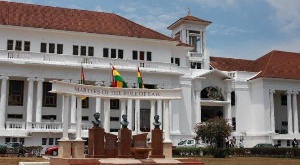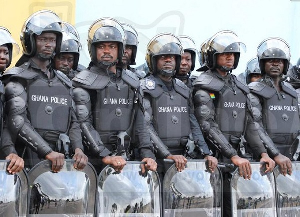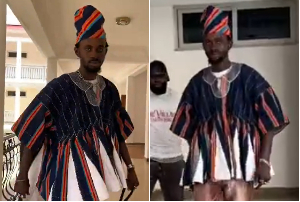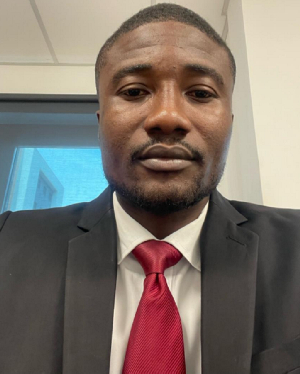The controversy surrounding by “Montie” case is not going away today or tomorrow.
In fact, since appearance of the contemnors before the Supreme Court (SC), their subsequent summary trial (if there was one), conviction and the fines imposed on all in addition to the jailing of the infamous Gang of Three, the case has generated a lot of debate amongst Ghanaians in and outside Ghana.
In this article, I intend to analyse whether the SC’s actions and omissions on the Montie contemnors were within the letter and spirit of the 1992 Constitution.
In my first article on this matter entitled “Is the SC Seeking Revenge or Administering Justice?”, (Ghanaweb, July 31, 2016), I concentrated on the conviction of the Directors and Owners of Montie and relied on legal doctrines of “actus reus” (commit a guilty act) and “mens rea” (having had a guilty state of mind) as well as "respondeat superior" (let the superior answer) to conclude that the SC did not meet the threshold for the general basis for imposing corporate criminal liability in criminal law and therefore the conviction and fine of the Directors and Owners were unsustainable.
I also indicated that because the contempt was “ex facie curiae” (outside court) and not “in facie curiae” (in court) the SC was wrong in summoning the contemnors, convicting and sentencing them on their own plea instead of sending the case to the High Court for trial.
In this article, I intend to analyse the constitutionality or unconstitutionality of the SC judgement in the Montie case collectively, relying on Articles 126(2), 19(1)(11)(12) and 14(1) of the 1992 Constitution.
Let me again clarify that this article is not about whether what the Montie Gang of Three did was right or wrong, neither is it about whether they should be pardoned or not. It is equally not about free speech or press freedom because as my view is that no rational human being can justify what they said because it has nothing to with free speech and press freedom. Rather, the article is about constitutional jurisprudence of the SC of Ghana.
In a preface to his book, “The Concept of Law” (1981), HLA Hart defined “the term jurisprudence as wisdom about law. This wisdom, however, is not simply knowledge of the laws, rather it is an attempt to understand how the laws fit together and what sort of overarching principles provide the glue to keep them together."
According to him, constitutional jurisprudence is a species of jurisprudence concerned with a certain kind of law, fundamental law. A constitution is fundamental in that it founds the institutions that will be responsible for enacting all other laws and purports to demarcate the respective powers of and restrictions upon these institutions.
The above reference is to buttress my argument that the interpretation of constitution should be done in such a way that not only the laws fit together but also which of the overarching principles provide the glue to keep them together as I will attempt to do with the relevant sections of the 1992 Constitution.
For the avoidance of any doubt, let me quote the relevant Articles of the 1992 Constitution that I seek to rely on to state my case in the development of constitutional jurisprudence vis-à-vis the Montie case.
Article 14(1) Every person shall be entitled to his personal liberty and no person shall be deprived of his personal liberty except in the following cases and in accordance with procedure permitted by law;
Article 19 (1) A person charged with a criminal offence shall be given a fair hearing within a reasonable time by a court;
Article 19(11) No person shall be convicted of a criminal offence unless the offence is defined and the penalty for it is prescribed in a written law; Article 19(12) Clause (11) of this article shall not prevent a Superior Court from punishing a person for contempt of itself notwithstanding that the act or omission constitution the contempt is not defined in a written law and the penalty is not so prescribed; and
Article 126(2) The Superior Courts shall be superior courts of record and shall have the power to commit for contempt to themselves and all such powers as were vested in a court of record immediately before the coming into force of this constitution.
Prior to analysing the above Articles let me restate that those who are relying on Articles 126(2) and 19(12) to justify the summary conviction, fine and incarceration of the Montie contemnors are wrong because the two articles are applicable only in “in facie curiae” contempt. Why do I say so?
Articles 19(12) and 126(2) are couched in language which is manifestly self-evident that the power to punish for contempt by that same court is limited to only when the contempt occurs in court. These are the words “itself” and “themselves”.
These words means that the contempt is not only real but actual and has happened so the court/judge must take immediate action by himself or herself to stop the court from being (further) scandalised, brought into disrepute, unable to administer justice, etc. Apart from that all other contempt that occurs outside court should be tried not in the same court and by the same judge but in another court with a different judge.
This above is supported by the legal doctrine of “nemo judex in sua causa” (no-one should be a judge in his own cause) held scared in most democratic societies. This is to avoid any appearance or presumption of a possible bias, even if there is actually none at all.
The fact is, justice must not only be done, but must be seen to be done. The Montie Three threatened the lives of the Justices of the SC and therefore all the Justices of the SC had a cause in the case and not only those who were mentioned by names. Therefore, under “nemo judex in sua causa” and by the fact that the contempt was out of court, the SC acted unconstitutionally by not asking the High Court to try the contemnors. In other words the SC breached Articles 19(12) and 126(2).
Article 19 (1) requires a fair hearing (trial) for those charged with criminal offence. There is no condition, exception or derogation for this requirement unlike Article 19(11) because it is one of the universal fundamental human rights. Without this safeguard injustice could occur even in democratic societies with strict adherence to rule of law.
Derogations are allowed only in times of emergencies such as war and not in peace time. Could any of the SC Justices look at themselves in the eye and say that what happened to the Montie contemnors constitute a fair hearing or trial? The answer is emphatically not.
The whole exercise was conducted in an atmosphere of fear and intimidation by the Justices. Though the contemnors were represented by Attorneys, they could not freely put up a defence for their clients. The same happened to the Presidential Petition hearing contemnors in 2013.
In fact, the brevity of Hon Atta Akyea to defend his client, Mr Ken Kuranchie annoyed the Justices and was subsequently given a harsher sentence compared to those who pleaded guilty and begged for clemency. This fundamental constitutional right of citizens was breached also by the SC.
Finally, let’s consider Article 14(1). It is important to note again the language used particularly the words “and in accordance with procedure permitted by law”. The question again is, were the SC’s summary trial, conviction and sentencing of the contemnors “in accordance with procedure permitted by law” prior to the SC interfering with the liberty of the contemnors? The answer again is, equivocally No for the following reasons.
In the case of the Directors and Owners the legal principles of corporate criminal liability (“actus reus”, “mens rea” and "respondeat superior") were not met and in the Gang of Three, the contempt was out of court. Again, the SC Justices disregarded “nemo judex in sua causa” and were judges in their own cause.
The summary trial, conviction and sentencing were anything but a fair hearing/trial and last but not the least, the taking away of their liberty was not in accordance with procedure permitted by law as required under Article 14(1).
Irrespective of what Articles 126(2) and 19(12) say, Articles 14(1) right to liberty, 19(1) right to fair trial and Article 19(11) cannot and should be truncated or abrogated in “ex facie curiae” contempt. Why? This is because the interpretation and application of constitutions (constitutional jurisprudence) are done holistically but not by a selection of their individual components as HLA Hart alluded.
In fact, the holistic approach in constitutional jurisprudence is also supported by no other judicial body other than Ghana’s SC. For example, in the case of Prof Stephen Kwaku Asare v The Attorney General (challenging the authority of the President to initiate amendment to the 1992 Constitution through a Constitution Review Commission), this is how the SC addressed this important constitutional jurisprudence principle.
Writing the leading opinion in the majority decision, the presiding Justice and Chief Justice, Her Lordship Georgina Wood said and I quote. “In construing the relevant Article 289 and other constitutional provisions, in a bid to unlock mind of the framers of the 1992 Constitution, I have been guided by the basic well-established constitutional principles that have influenced constitutional interpretation in this court.
These include the need for a purposively broad, liberal and benevolent interpretation of the Constitution as a whole, so far as the language of the constitution would admit, having due regard to the underlying values and principles that need to be promoted to safeguarded our system of participatory democracy, the principle that the constitution is a document sui generis, and allied to this, the principle that the constitution must be interpreted in the light of its own words, and not words found in some other written constitution” (Writ No: JI/15/2015 [unreported] pages 23 & 24).
It is therefore my case based on the above principle the constitutionality or unconstitutionality of the Montie case and the actions and omissions of the SC could be properly determined only when all the relevant Constitutional Articles, especially but not limited to, Articles 126 (2) and 19(12) are balanced against Articles 19(11), 19(1) and 14(1).
These Articles applied and interpreted in sync, coupled with legal doctrines or principles of “ex facie curiae”, “actus reus”, “mens rea”, "respondeat superior" and “nemo judex in sua causa”, all of which were breached and disregarded respectively by the SC, my conclusion is that the SC acted unconstitutionally in the Montie case. Their trial, conviction and sentencing is miscarriage of justice.
The SC is not a trial court but an appellate one and should never constitute itself into a prosecutor, judge and jury and sit in its own cause as if it is the Chief’s Palace where the accused is hauled before the Chief and his elders, tried, found guilty and ordered to present seventy-two rams and seventy- two bottles of schnapps to pacify the gods and ancestors in a constitutional democracy.
This precedent, second in four years is dangerous because it has given High and Appeal Court Judges automatic and unfretted powers to summarily convict for contempt and sentence contemnors in “ex facie curiae” contempt without due process but also sit in the court of their own cause. The SC’s breaches of the above cited constitutional Articles and its total disregard for legal doctrines and principles that are international customary practices are not only unconstitutional but also tantamount to scandalising the judiciary.
Why is the Ghana Bard Association silent on such miscarriage of justice by the apex court of the land? I live you with Martin Luther King’s quotation. “The ultimate measure of a man is not where he stands in moments of comfort and convenience, but where he stands at times of challenge and controversy”
Opinions of Wednesday, 10 August 2016
Columnist: Ata, Kofi















